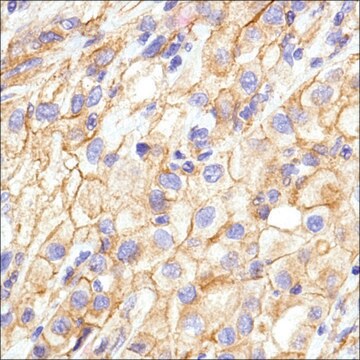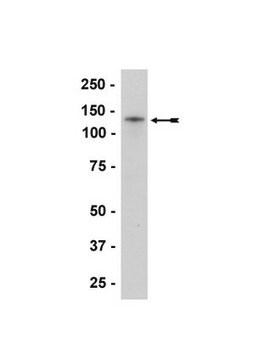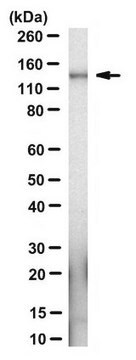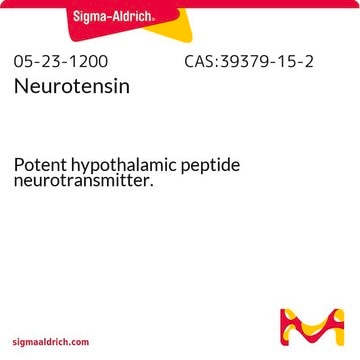MABF3160
Anti-N-Cadherin Antibody, clone 8C11
Synonyme(s) :
Cadherin-2;CDw325;Neural Cadherin;CD325
About This Item
Produits recommandés
Source biologique
mouse
Niveau de qualité
Conjugué
unconjugated
Forme d'anticorps
purified antibody
Type de produit anticorps
primary antibodies
Clone
8C11, monoclonal
Poids mol.
calculated mol wt 99.81 and 97.04 kDa
observed mol wt ~105 and 130 kDa
Produit purifié par
using protein G
Espèces réactives
hamster, human
Conditionnement
antibody small pack of 100 μg
Technique(s)
flow cytometry: suitable
immunocytochemistry: suitable
inhibition assay: suitable
western blot: suitable
Isotype
IgG1κ
Séquence de l'épitope
Extracellular domain
Numéro d'accès Protein ID
Numéro d'accès UniProt
Conditions d'expédition
dry ice
Modification post-traductionnelle de la cible
unmodified
Informations sur le gène
human ... CHD2(1000)
Description générale
Spécificité
Immunogène
Application
Evaluated by Western Blotting in Human heart tissue lysate.
Western Blotting Analysis: A 1:500 dilution of this antibody detected Cadherin-2 in Human heart tissue lysate.
Tested applications
Western Blotting Analysis: A 1:500 dilution from a representative lot detected N-Cadherin in Human brain and cerebellum tissue extracts.
Western Blotting Analysis: A representative lot detected N-Cadherin in Western Blotting applications (Kim, J.B., et al. (2000). J Cell Biol. 151(6):1193-1206).
Flow Cytometry Analysis: 1 μg from a representative lot detected N-Cadherin in one million KG-1 cells.
Inhibition Assay: A representative lot inhibited motility of BT20 breast cancer cells (Kim, J.B., et al. (2000). J Cell Biol. 151(6):1193-1206).
Flow Cytometry Analysis: A representative lot detected N-Cadherin in Flow Cytometry applications (Wahlig, S., et al. (2020). Sci Rep. 10(1):1681).
Immunocytochemistry Analysis: A representative lot detected Cadherin-2 in Immunocytochemistry applications (Navarro, P., et al. (1998). J Cell Biol.;140(6):1475-1484).
Note: Actual optimal working dilutions must be determined by end user as specimens, and experimental conditions may vary with the end user
Forme physique
Stockage et stabilité
Autres remarques
Clause de non-responsabilité
Vous ne trouvez pas le bon produit ?
Essayez notre Outil de sélection de produits.
Code de la classe de stockage
12 - Non Combustible Liquids
Classe de danger pour l'eau (WGK)
WGK 2
Point d'éclair (°F)
Not applicable
Point d'éclair (°C)
Not applicable
Certificats d'analyse (COA)
Recherchez un Certificats d'analyse (COA) en saisissant le numéro de lot du produit. Les numéros de lot figurent sur l'étiquette du produit après les mots "Lot" ou "Batch".
Déjà en possession de ce produit ?
Retrouvez la documentation relative aux produits que vous avez récemment achetés dans la Bibliothèque de documents.
Notre équipe de scientifiques dispose d'une expérience dans tous les secteurs de la recherche, notamment en sciences de la vie, science des matériaux, synthèse chimique, chromatographie, analyse et dans de nombreux autres domaines..
Contacter notre Service technique








